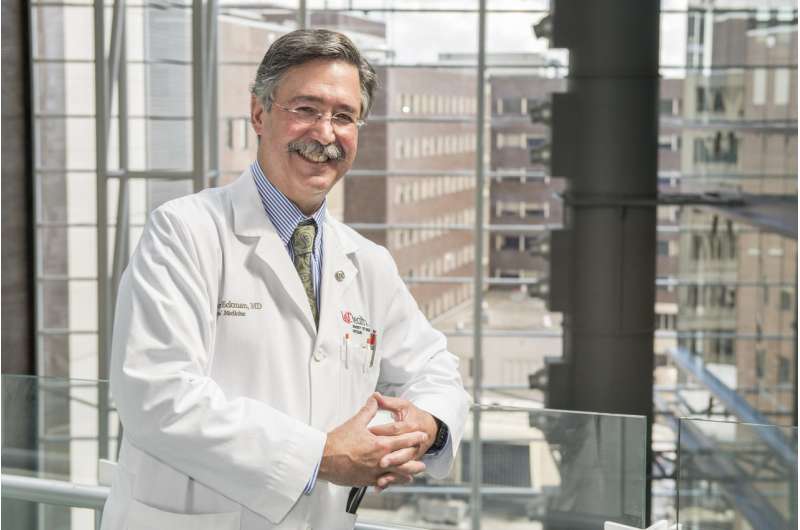Using hepatitis C-infected donor kidneys could reduce time on dialysis for transplant patients with HCV

Transplanting hepatitis C (HCV)-infected dialysis patients with organs from HCV-positive donors and then treating the infection after transplantation is more effective, costs less and will shorten wait times for donated organs, according to a computer analysis conducted by physician-researchers at the University of Cincinnati (UC) College of Medicine.
The findings are available online in the Annals of Internal Medicine. The study's lead author is Mark Eckman, MD, professor and director of the UC Division of General Internal Medicine.
The model predicts that transplantation with an HCV-infected kidney followed by HCV treatment was more effective and less costly than treating HCV before transplantation, largely because of the longer wait times for HCV-uninfected kidneys, explains Eckman. A typical 57.8 year-old patient receiving hemodialysis would gain an average of six months of additional quality adjusted life years at a lifetime cost savings of $41,591, says Eckman.
A patient receiving a non-infected kidney waits on average more than two years for that organ, while the wait for an HCV-infected kidney is about eight months, says Eckman, a UC Health physician. Also, 15 percent of patients undergoing dialysis for end-stage renal disease are infected with HCV.
"There is a high excess mortality risk for patients receiving hemodialysis and it is associated with a decreased quality of life for some patients," says Eckman. "If you can spend less time on dialysis, you will be better off. The annual cost of hemodialysis is more than $90,000."
In the United States, an estimated 110,000 patients start dialysis each year. Of the approximately 500,000 patients who received dialysis for end stage renal disease in 2016, only 3.8 percent or 19,060 received kidney transplants, says Eckman.
The computerized decision analytic model pulled data from a variety of sources including the United States Renal Data System (USRDS), medical literature and clinical trials. The model looks at several factors such as sex, age, the degree of liver damage from chronic HCV infection, and treatment costs to predict outcomes that may occur over the lifetime of a patient cohort for each of the clinical strategies studied, explains Eckman.
"While people are waiting for a kidney, there is a risk of dying on hemodialysis, with a mortality rate of approximately 7.5 percent per year," says Eckman. "If you wait a shorter time to get a kidney transplant by accepting an HCV-infected kidney, you can avoid a year-and-a-half or more of time on a waiting list.
"Once you have a transplant, the annual mortality rate is roughly 2 percent per year instead of about 7.5 percent per year. The shorter the period of time waiting for a kidney on dialysis, the better your outcomes will be."
Eckman says the computer model is needed because there are no large clinical trials yet that have addressed this question.
"This isn't something we would have asked or thought about even a year ago," says Eckman. "Now, we have very effective HCV treatments that we didn't have two or three years ago. Some of these new medications can be used in patients on dialysis. The new drugs have much fewer side effects, and the treatment course is a lot shorter. The treatment of HCV has advanced dramatically."
Several clinical trials have shown HCV cure rates as high as 98 percent with the new drugs, says Eckman.
"Secondly, a year ago we didn't have drugs to treat HCV that could be used in patients with end stage renal disease," says Eckman. "While treatment of HCV is very expensive, this cost balances out in our analysis as patients in both strategies are getting treated for HCV."
There are tradeoffs between the two strategies. Patients who get a non-infected HCV kidney have a lower risk of dying from liver disease because HCV is treated earlier, before kidney transplantation, says Eckman. But HCV-infected patients who receive an HCV-infected kidney are able to get off of dialysis sooner and have a lower risk of dying from end stage kidney disease.
"It is better to wait less time for a kidney by getting an HCV-infected kidney followed by treatment after transplantation," says Eckman.
He adds that the supply of HCV-infected kidneys has increased due to the unfortunate deaths of otherwise generally healthy young individuals who suffer opioid overdoses.
"What we hope is that this study will have some impact on policy," says Eckman.
More information: Annals of Internal Medicine (2018). annals.org/aim/article/doi/10.7326/M17-3088
Annals of Internal Medicine (2018). annals.org/aim/article/doi/10.7326/M18-1718













